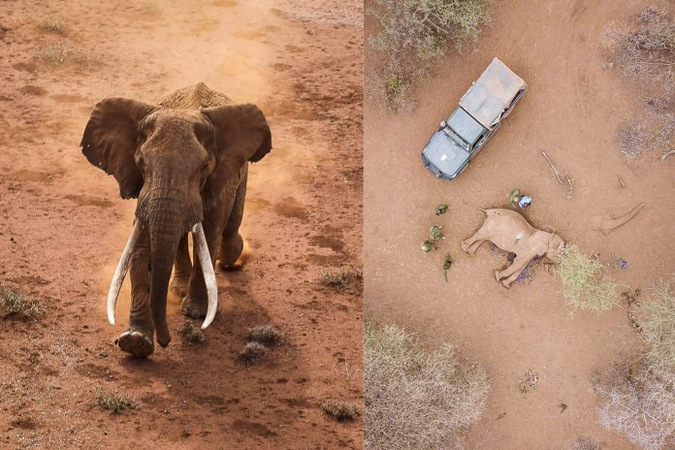Ndawe the tusker was the missing link, the proof we sought. We were sure that elephants made the long journey between Tsavo and Amboseli, and he was the confirmation. By Big Life Foundation
Ndawe was known as a ‘hundred pounder/tusker’, an elephant whose tusks weigh 100 pounds or more, and of which there are thought to be less than 100 on the entire continent. He was first spotted from the air in late 2016 and, on a whim, Big Life sent the photograph to THE TSAVO TRUST, who monitor the tuskers of Tsavo. The response was exciting – this was indeed a tusker that they knew, last seen in 2014. We have no idea how frequently he made the journey and still don’t know how many others do the same.

Sadly Ndawe’s journey has ended at the hands of humans, death delivered by four spears. He was speared for the first time in late April this year and treated by the joint Kenya Wildlife Service/The David Sheldrick Wildlife Trust mobile veterinary unit. We don’t know why he was speared this first time, it was potentially the result of crop-raiding and conflict with humans.
The next spearings are more sinister. The area where Ndawe lived is now separated from cropland by the newly constructed electric crop-protection fence, and so it is highly unlikely that these are the result of conflict. The fact that three spears hit is even more unlikely in a spontaneous conflict incident. Big Life is confident that this was a poaching attempt, perhaps opportunistic.
Ndawe’s condition had been declining since the first spear wound treatment, and his recovery was not helped by the dry conditions and poor quality forage at this time of the year. It is likely that this did not go unnoticed, and he was targeted by poachers due to his weakness.
But none of the spears killed this tusker immediately, rangers reported the wounds and he was darted for treatment once again. Sadly, this time he did not get up. Infection from the wounds, his poor health, and age all contributed, but it was spears that killed him. At an estimated 55-60 years, he was a grand old bull and with his teeth worn down he was right at the end of his life, but this was a sad way to finish it.
The only consolation is that his tusks have been retrieved, and his death will not line a poacher’s pockets. We are doing what we can to track his killers, but for now, the scent is cold.
However, his life will have an enduring impact because he is proof of the importance of the Kimana conservancies and corridor, a highly threatened but critical link that elephants use to travel around the ecosystem. His name will certainly be a powerful force in the future as Big Life continues to work to protect this important corridor.
Also read: Super tusker Tolstoy treated for spear wound
To comment on this story: Login (or sign up) to our app here - it's a troll-free safe place 🙂.![]()






